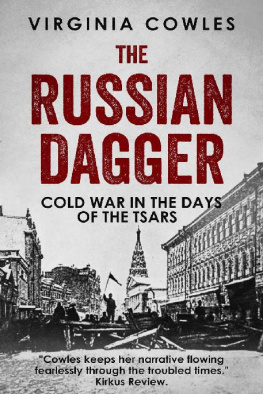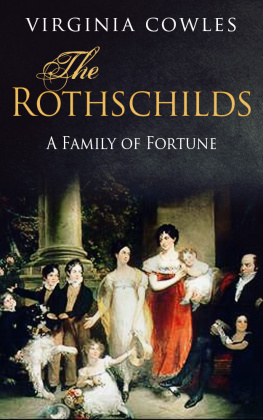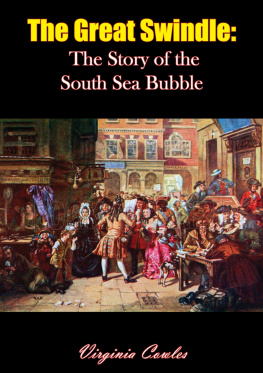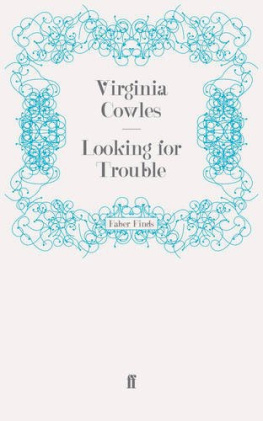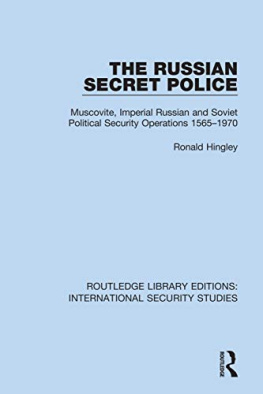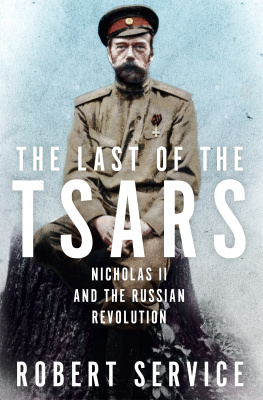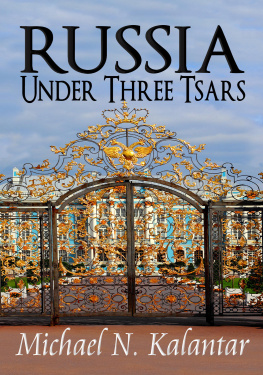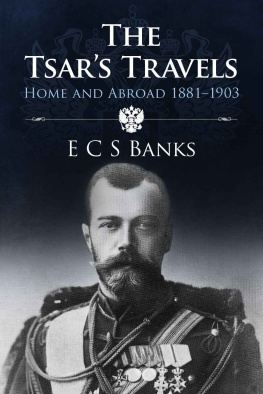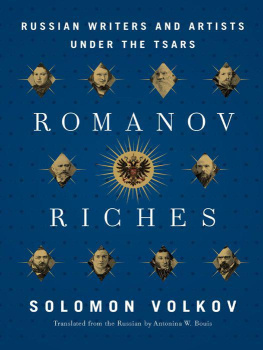The Russian Dagger
Virginia Cowles
Virginia Cowles
Virginia Cowles has asserted her rights under the Copyright, Design and Patents Act, 1988, to be identified as the author of this work.
First published 1969 by Collins.
This edition published 2018 by Sharpe Books.
For my sister and brother-in-law
Mary and Carl Holtz.
Table of Contents
Preface
This is the story of Russias attempts to expand in Europe in the sixty years before the First World War, against a background of dynastic relationships which made the rivalries personal and acute. A love of conspiracy has always been part of the Russian character; and the author has tried to show how the rise of the revolutionary movement affected Russian techniques of expansion. In 1881 Count Leo Tolstoy was horrified by the assassination of Alexander II. He felt that the terrorists, descendants of Nihilists and Nechaevsti who preached the destruction of moral ethics, were spreading a poison that threatened the whole fabric of Russian society. He asked the new Czar to pardon the regicides as an act of Christian mercy, which might have the effect of jerking the country to its senses. Alexander III not only refused but allowed his officials to employ the same methods of violence and treachery in extending Russian influence in Europe. The two movements, subversion at home and subversion abroad, not only stimulated but fed one another. Although their aims were very different, one to overthrow the Czar, the other to increase the Czars power, both were revolutionary.
They flourished side by side and did not cease with the Bolshevik seizure of power in 1917. Nechaevs belief, postulated nearly half a century earlier, that the end justifies the means, became part of Russian Communist policy, and the imperialism of the white Czars was copied and improved by the red Czars.
The similarity between the two Russias, past and present, is startling and depressing. Russia has produced many great writers and musicians, but very few great rulers. It is impossible to separate government and governed forever. Why is there always a new tyrant to take the place of the old? Does it spring from the Asiatic streak in the Russian character? Or, as Tolstoy prophesied, is it a natural consequence of the rejection of Christianity? This book does not attempt an answer but tries to show what happened.
VIRGINIA COWLES
April, 1969
19 Chester Square, London, S.W.1
ONE - Philosophers at Court
It was no secret, in the winter of 1839, that the romantic, twenty-year-old Grand Duke Alexander, eldest son of Nicholas I of Russia, was touring the German kingdoms in search of a wife. The tyrannical Czar doted on his heir and had given him permission to make his own choice, provided the lady was not a commoner and not a Roman Catholic. The Empress Alexandra, on the other hand, favoured one of the Baden girls and anxiously awaited news from the poet Zhukovsky, her sons tutor and travelling companion. When the letter arrived, however, it was plain that the Karlsruhe visit had been a failure. The poet scarcely mentioned the Baden princesses, observing tactfully that he had nothing to tell about the Grand Dukes heart. It keeps its own secret.
Darmstadt was not on the Grand Dukes itinerary except as a place to change horses en route to Mainz, and to pay a brief courtesy call on the Grand Duke Louis II of Hesse-Darmstadt. But the Russian entourage arrived in the small, out of the way capital some hours behind schedule and the Grand Dukes aide persuaded his master not to proceed farther until the morning. Louis was delighted to entertain such distinguished company. He took his guests to the opera and arranged a late supper at the palace. He presented to Alexander his three sons, the youngest of whom was the sixteen-year-old Prince Alexander of Hesse, and his only daughter, the fifteen-year-old Princess Marie. Marie had huge eyes and a delicate, oval face. Not only was she beautiful but alarmingly intelligent.
The Grand Duke Alexander could not take his eyes from her. The next morning, he sought out the faithful Zhukovsky and told him that he had fallen hopelessly in love. Just where we least expected it to happen it has happened, Zhukovsky wrote exultingly to the Empress Alexandra. To call him happy would be hardly enough I am convinced that it is Gods intention for him The aim of all our travels is at last achieved Now he will be waiting for your Majestys blessing and consent
The Princess had fallen just as deeply in love, for the tall, blue-eyed Alexander not only was gentle and thoughtful but the handsomest prince in Europe. He cancelled his tour, and the lovers spent idyllic days together until a special courier arrived from St. Petersburg with a shattering letter from the Czar. He forbade the engagement and demanded Alexanders instant return to Russia, reminding him that he was due to visit the Court of St. James in two months time. No explanation was given. White-lipped, Alexander saw the Grand Duke Louis and told him that despite the Czars attitude he considered himself betrothed to Marie and would never marry anyone else. His father was fond of him, he said, and he was certain that in the end he would overcome his objections.
Not until he reached the Russian capital did he learn the reason for the Czars attitude. It sprang from stories concerning the unconventional behaviour of Princess Maries mother, the Grand Duchess, who had died some years earlier. Apparently this well-connected lady, whose four sisters had shared the thrones of Russia, Sweden, Brunswick and Bavaria, resented her husbands many infidelities, and after bearing him three sons, decided to strike out on her own. She took as her lover the Court Chamberlain, the Baron Augustus von Senarclens Grancy. Fourteen years after the birth of her last child she became pregnant again; first came Alexander, then Marie. Tongues wagged furiously but the Grand Duke remained impervious, and his unruffled acceptance of paternity forced the Grand Duchesss detractors to keep their indignation under control.
The Czarevitch was unmoved by this disclosure; if he had to choose between Marie and the throne, he said, he would prefer to relinquish the throne. Nicholas sympathised, for he had fallen deeply in love with Alexandra when, as the beautiful Princess Charlotte of Prussia, she had become engaged to him; and he continued to love her all his life. Within a few days he was defending the choice his son had made. When the Emperor paid me the honour of discussing the probability of the marriage of his son to the Princess of Darmstadt, the Austrian Ambassador wrote to Prince Metternich that April, he told me he knew all that was said about the irregularity of her birth but as the Grand Duke took no notice of it, he found nothing to object to on that account.
The Empress Alexandra was not so easy to win over. I know that secretly this choice pains the Empress. She is very vexed by the doubts over the Princesss birth, or at least by the rumours of it in Germany. The Empress had other objections, for Maries mother had died of consumption and Marie herself was known to suffer from a delicate chest. The final decision was that Alexander must put aside all thought of an engagement for at least a year; at the end of the period his parents would reconsider the proposal. Then they packed him off to England.
The Grand Dukes upbringing had been so thorough that he managed to conceal his agitation from the twenty-year-old Queen Victoria and to be a model of charm and attentiveness. He accompanied her to concerts and theatres and partnered her in lively mazurkas and German country dances which were quite new to her. I never enjoyed myself more, she wrote in her Journal. I got to bed by to to 3 but could not sleep till 5. I really am quite in love with the Grand Duke; he is a dear, delightful young man. However, the sharp-eyed French nobleman, the Marquis de Custine, who met the Grand Duke at Ems on the return journey from England, noticed an inward suffering. Although he remarked on Alexanders Grecian profile and described him as one of the finest models of a prince I have ever met with he observed that he is under the influence of some cause of grief; his eyelids are cast down with a sadness that betrays the cares of a riper age.
Next page
